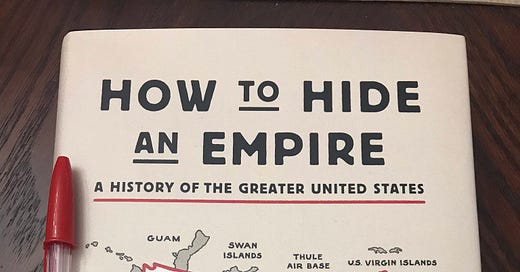How To Hide An Empire by Daniel Immerwahr
This book reinforced the lesson of imperialism and colonialism. Imperialists can never lead a country better than the natives for the simple reason that it is never in their interest to do so.
Geopolitics enthusiasts will know how the word "Empire" is thrown around the United States today. Both critics and admirers of the United States use the word. From Niall Ferguson (Colossus: The Rise and Fall of the American Empire) to Howard Zinn's (A People's History of The United States), both stretch United States history to make the empire claim. In both cases, Niall's of admiration and Howard's of condemnation, the case for Empire is not made as quickly as one would make of British Empire. This book changes all of that.
It turns out that the United States was not just an empire metaphorically. It was an empire in practice. Daniel Immerwahr makes his case with a clarity that makes you sit down and want to listen. He does not have the anger that often muddles such important work.
This book begins with how America entered the Second World War. Most Americans remember that America got involved in the war after the attack on Pearl Harbor. However, what most Americans do not recognize is that on the same day that the attack on Pearl Harbor happened, the Japanese also attacked the Philippines, Guam, Hawaii, Wake Island and Midway Island. All of these were considered US Territories, and indeed, US President Franklin Roosevelt was chagrined about them as the attack on Pearl Harbor. Yet, in his speech, he intentionally evaded those territories. Of course, the United States went on to fight to regain those territories.
This was how to hide an empire. It was not the first, nor was it the last.
Daniel does an impressive job of piecing together these evasions by various US leaders and telling a good single narrative. Some of the information he shares is not so obvious, and others are so obvious. Daniel's greatness is that he could find the patterns of the Empire in the not-so-clear ones. He goes further to write a comprehensive narrative. The sheer amount of connections he made was impressive to me. It is rare to find a book that connects General Douglas MacArthur to bolts and nuts. But they are all connected. Even James Bond has a feature!
The parts where he discussed the history of specific territories were pretty good. It was the first time I had learned the history of Puerto Rico, the Philippines, and Guam.
Of course, the territories were not democratically led as the United States was led. While people on mainland US could vote, the territories got whatever they were given. In many cases, what they got were autocrats who did whatever they wanted to do without being accountable to anyone. This led to campaigns that used citizens in the territories as Guinea pigs for experiments. So many deaths went unaccounted for. Extrajudicial killings were never investigated.
This book reinforced the lesson of imperialism and colonialism. Imperialists can never lead a country better than the natives for the simple reason that it is never in their interest to do so. When the chips are down, everyone chooses their interests. It is the iron rule of nature. The US has done this many times in its territories.
A prominent example I always refer to was the Bengal Famine that happened at the end of the Second World War. While millions of Bengalis were dying, Winston Churchill prioritized supply for Britain's soldiers and citizens; he chose to supply rare food to Britain rather than to provide it to Bengalis. Of course, many more died. His critics have continued to hold this against him, and his admirers continue to explain that he was only doing his duty as the protector of Britain. I have always replied that the leaders of India would not have allowed their citizens to perish without doing anything. They would have prioritized Indian citizens over British citizens, just precisely as Britain had done. But that's only if India was a free nation.
Any benefits that come to colonized nations are often side benefits gotten when the colonizers' main intention is achieved. No one colonizes a nation to give it "free trade," "democracy," "human rights," etc. The irony of using violence to bestow democracy is funny to me.
Let's not deviate too far; back to this book.
As with stories of oppression everywhere, there was resistance, and so in this book, you will find heroes—heroes who fought in various ways. That's the lesson from history: it is easy to conquer territory, but it is far more difficult to conquer a whole people's group.
This is a good book for understanding the Empire of the United States of America.
My fascination with America continues. It is worth checking how a country with so many flaws still maintains its lead in world affairs. America is great not because it is without faults; it is great in spite of them.





Great review. I will surely read this one.